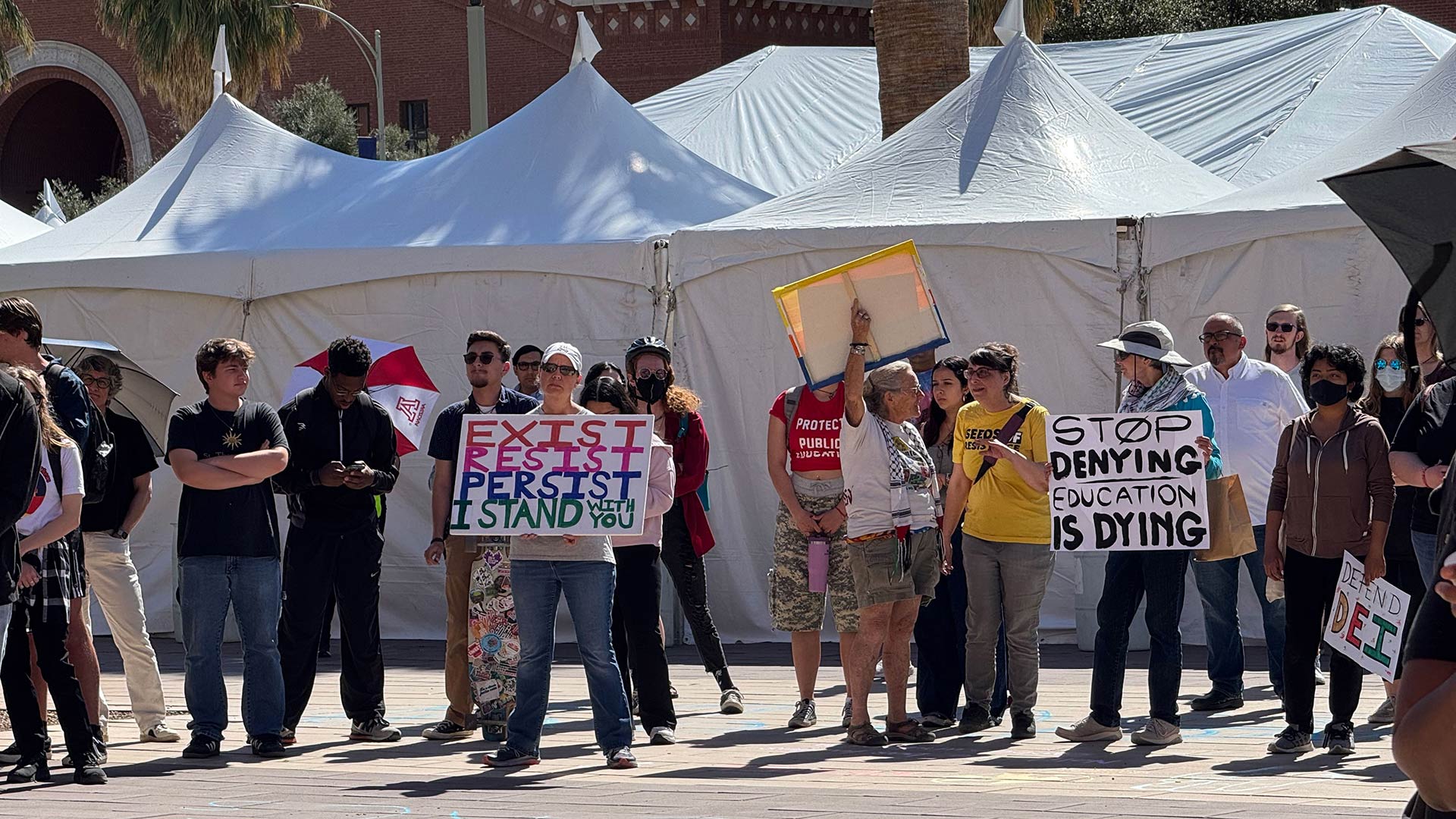 Students, staff and faculty at the University of Arizona demonstrate outside the UA Administration building in support of diversity, equity, inclusion and accessibility programs amid several actions to soften DEI language on public-facing UA websites.
Students, staff and faculty at the University of Arizona demonstrate outside the UA Administration building in support of diversity, equity, inclusion and accessibility programs amid several actions to soften DEI language on public-facing UA websites.
Students and faculty held a rally Thursday in response to ongoing uncertainty over the future of diversity, equity, inclusion and accessibility programs on campus.
At least 200 students carried signs in front of the University of Arizona’s Administration building and chanted “stop denying, education is dying,” and “protect our diversity.”
The protest comes shortly after a group identifying themselves as Wildcats4DEIA sent an open letter addressed to President Suresh Garimella, his Cabinet, and Provost Ron Marx, criticizing what they see as a softening in campus-wide DEI language.
In the last week, the University removed the phrase “committed to diversity and inclusion” from the third sentence in its land acknowledgement, and took down the Office of Diversity and Inclusion’s website.
“We view your actions as preemptive and harmful over-compliance. Faculty, staff, and students should not have to fear political retaliation for upholding academic freedom, engaging in free speech, or advocating for their rights,” the letter reads.
As of Thursday afternoon, the Google Form letter had received about 2,300 signatures. Of those, just under 1,000 identified themselves as students, and 550 as faculty and staff. About 500 people remained anonymous, and the remaining signatures were community members.
University spokesman Mitch Zak said the University received the letter Tuesday afternoon.
"We have just received the letter and will review it, as we do all input. We will continue to keep the university community informed on these matters as appropriate," he said.
On Feb. 14, a memo from the Department of Education gave universities two weeks to end DEIA programs or face federal funding cuts, on the basis that they are discriminatory.
At the state level, Arizona Senate Republicans passed a bill through the education committee that would withhold state funds from colleges and universities that continue to teach DEI ideologies; systemic racism, gender identity, and social justice were specifically named in the bill, among many others.
However, UA Faculty, staff and students assert the DEI programs are still legal.
“I think it's premature and probably illegal to be following policies that are already, in many cases, blocked or under injunction,” said Jennifer Roth-Gordon, an associate professor of anthropology who signed the letter. “It’s really damaging and dangerous.”
The letter refers to a legal brief drafted by law professors at 19 universities, asserting that DEIA language and resources remain legal under the current laws. President Trump’s efforts remain blocked after a judge ruled his executive orders that attempted to remove “equity-related” funding were likely unconstitutional.
Vanessa Perry, associate professor in the College of Education, said public-facing language matters, and the removal of the Office of Diversity and Inclusion website particularly concerns her about the future of the University’s cultural resource centers.
“Identity and language are interwoven. They are indivisible from one another. So if you tell me, a Latina, that I can’t call myself a Latina anymore, you are stripping my latinidad from me,” she said.
Faculty are also concerned that language softening is just a beginning.
“Did we ever think that in the United States, we're having to worry about the government telling us what we can and cannot teach? I think the fact that you can even pose that question is really indicative of the dangerous moment that we’re in right now,” said Jennifer Roth-Gordon, an associate professor of anthropology who researches race in Brazil.
Junior Austin Willis is a member of the Tucson chapter of Iota Phi Theta, a historically Black fraternity that has many UA student members.
The organization wrote their own letter to President Garimella dated Feb. 24, urging leadership to “reaffirm, in words and deeds, a true commitment to diversity, equity, and inclusion.”
Willis said he hopes to see the University commit to preserving jobs and positions within the University’s Martin Luther King Jr., Center, also the physical location of the Office of Diversity and Inclusion.
“It’s a safe space. It’s where we can go to build our community, to share our culture, to celebrate our culture, which on this campus isn’t always commonplace,” Willis said.

By submitting your comments, you hereby give AZPM the right to post your comments and potentially use them in any other form of media operated by this institution.